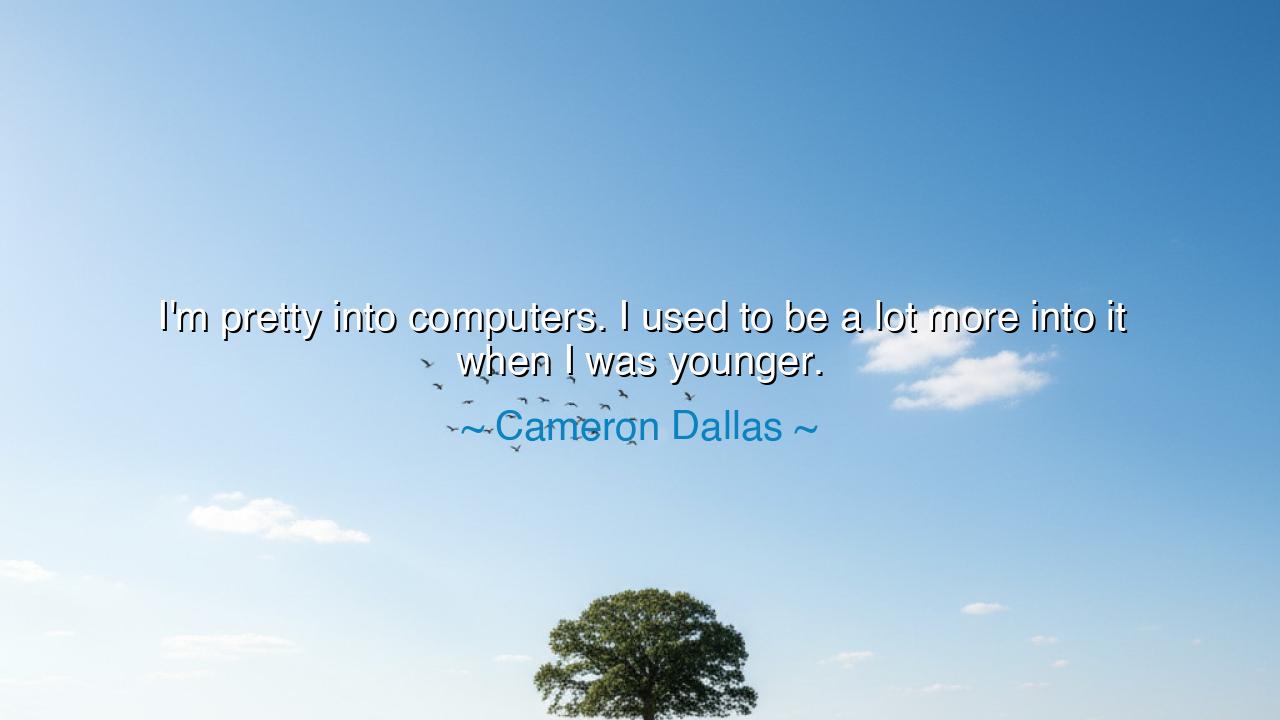
I'm pretty into computers. I used to be a lot more into it when I






There is a quiet truth hidden within the simple words of Cameron Dallas, who said: “I’m pretty into computers. I used to be a lot more into it when I was younger.” Though spoken lightly, as one might speak of a pastime or passing interest, within these words lies a reflection on the ebb and flow of passion, the natural rhythm of human curiosity. For every soul burns with certain fires in youth — fierce, consuming, and bright — yet with time, those flames may soften into embers. The ancient ones would say: to be human is to be ever-changing, to rise in devotion and later to drift toward new horizons. Thus, Cameron’s words are not of regret, but of remembrance — a recognition that the passions of youth shape us, even when they no longer define us.
In the early years of one’s life, the world appears infinite, and every machine, every mystery, is a door to wonder. To be “into computers” in youth is to dwell in the realm of creation and logic, where worlds can be built from mere symbols. It is the joy of mastery — of bending the invisible will of circuits to human imagination. But as the years unfold, new callings arise: the pull of art, of love, of people, of life beyond the glowing screen. This shift is not decay; it is transformation. The child of code becomes the adult of experience, carrying within them the discipline and curiosity that once drew them to the machine.
So too was it with Leonardo da Vinci, whose passions changed like the seasons — from painting to anatomy, from flight to geometry. In youth he painted angels; in age, he dissected the workings of the heart. Yet every craft, though abandoned in time, fed the next. Nothing was wasted. The ancients called this the “chain of becoming,” where one pursuit ripens into another, and the self grows more whole through its wanderings. When Cameron Dallas speaks of once being “a lot more into it,” he speaks for all who have loved something deeply, and then released it — not from neglect, but from the forward motion of life itself.
Still, there is a melancholy beauty in these words, for they remind us of what is lost with the passage of years. The innocent fascination of youth — that willingness to lose oneself for hours in discovery — often fades as responsibility grows. The world, which once seemed full of infinite wonder, becomes a place of deadlines and duties. Yet the wise know that the secret of renewal lies in returning, now and then, to the child’s heart. To remember what once stirred our spirit is to draw again from the fountain of purpose. For though passions change, the capacity to marvel must never die.
There is an old story of Archimedes, the great thinker of Syracuse. As a boy, he played endlessly with shapes and mirrors, seeing beauty in their patterns. As a man, he became the greatest mathematician of his age — but when soldiers came to his door, they found him still lost in thought, drawing circles in the sand. “Do not disturb my circles,” he said, moments before his death. To his last breath, he held the same wonder he had as a child. From him, we learn that though we may grow older, the fire of curiosity must never be extinguished.
So, too, does Cameron’s reflection teach us to honor both the passion of our youth and the maturity of our present. It is not wrong to have moved on; it is natural. The things we once loved become part of our foundation, shaping who we are. The knowledge of computers may fade, but the mind trained to understand them — the problem-solving, the creativity, the focus — remains within us, like roots beneath the soil. Every skill, every fascination, leaves its imprint, and from those imprints, new paths grow.
The lesson, then, is one of remembrance and renewal. Do not mourn the interests that time has softened; instead, revisit them with gratitude. Let them remind you of the wonder you once felt, and carry that wonder into whatever you now pursue. If once you loved machines, let that same curiosity guide you toward human connection, art, or service. For the heart that once delighted in complexity still seeks meaning. And above all, remember: it is not the constancy of passion that defines a life, but the constancy of growth.
Thus, take these words of Cameron Dallas not as mere nostalgia, but as a hymn to the evolving soul. Be “into” the world — its mysteries, its people, its endless lessons. Let your passions transform, but never let them die. For though the tools may change, the spirit that once loved to create, to explore, to understand — that divine spark of curiosity — is eternal. And it is that spark, carried through every age, that makes life luminous.






AAdministratorAdministrator
Welcome, honored guests. Please leave a comment, we will respond soon